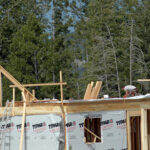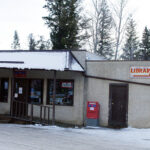Home »

Bill 4 puts BC Parks in peril: environmental groups
By Ian Cobb
On March 24, Bill 4 (the Park Amendment Act) became law, despite opposition from a consortium of leading environmental organizations and park advocates.
Changes to the Act allow poorly-defined industrial “research” to be conducted within provincial parks, facilitating removal of park land to allow for industrial activity, including pipelines, logging roads and resource extraction, noted a March 25 press release from environmental groups opposed to the bill.
“The minister has received thousands of letters opposing this bill since it was introduced last month, but the public’s concerns have been ignored,” said Peter Wood of Canadian Parks and Wilderness Society. “There has been absolutely zero public consultation, and the pace at which this was pushed through suggests this was never a consideration.”

“Over 2,000 people have emailed Minister Polak with their concerns from the Kootenays,” said John Bergenske, Executive Director of Wildsight.
“This bill undermines the very definition of what a ‘park’ is, given that our protected areas will now be open to industrial activity, ” said Gwen Barlee of the Wilderness Committee. “This is a black day for BC Parks – the provincial government is ensuring that none of our parks are now safe from industrial development.”
Previously, a park use permit could not be issued unless the applicant could prove that the activity was “necessary for the preservation or maintenance of the recreational values of the park involved.” Bill 4 removes this safeguard, allowing the minister to grant a permit if it is determined that the research relates to “an environmental assessment or a feasibility study,” or is “necessary to inform decision making around changing the boundaries.”
A government document obtained in late 2013 via a Freedom of Information request revealed that the BC government is already considering boundary changes to over 30 parks, including for LNG pipelines and the expansion of the Kinder Morgan pipeline. The bill also removes certain protections from smaller parks.
“The government has sent a clear signal that it is open to having pipelines cut through our globally renowned protected areas,” said Al Martin, BC Wildlife Federation. “The Act will now allow industrial exploration in some of B.C.’s most beloved parks, placing them at risk.”
“When Bill 4 passed, 2014 became the year that BC Parks changed forever,” said Darryl Walker, BC Government and Service Employees’ Union. “This legislation opens the door to pipelines, oil and gas drilling and industrial activities that are counter to the values that created our parks system.”
“This bill is confusing and raises suspicion; it does not provide the clarity that Minister Polak claims,” says Bob Peart, Sierra Club BC. “Rather than opening up our parks to special economic interests we should be emphasizing their critical role in providing enjoyment to families and for the protection of nature.”
“These changes are deeply unfair to the British Columbians who participated in the land use planning processes that established many of these parks,” said Stephanie Goodwin of Greenpeace. “We call upon the BC government to cancel Bill 4 immediately and develop alternative legislation that will safeguard the integrity of our parks against industrial activity.”

Kootenay East MLA and Minister of Energy and Mines, and Minister Responsible for Core Review Bill Bennett said he understands public concerns about misuse of BC Parks but “I think the reaction by environmentalists is, honestly, a little over the top.
“We all care about parks and it just isn’t credible in my opinion to suggest that all of a sudden government is going to open up parks to industrial activity. What government has done is put into place the authority to study a particular park if there is a major, strategic transmission line or pipeline that must go through a park.,” Bennett told e-KNOW. “This would be a rare circumstance and would only happen if it were impractical to go around a big park with a transmission line or a pipeline. No one is talking about building roads all over parks, or opening them up generally to industrial activity. I do appreciate that British Columbians love parks, but we do also have to have jobs and an economy.”







